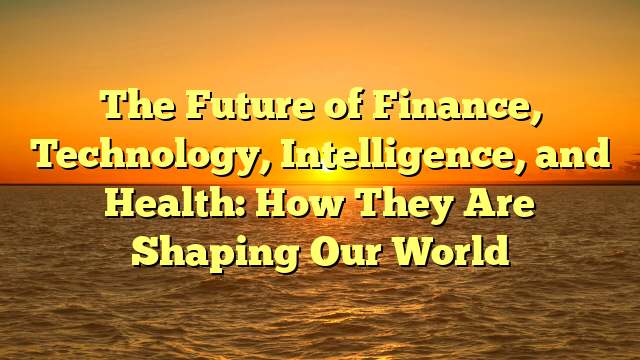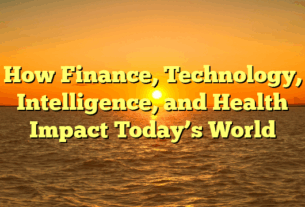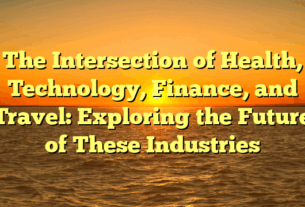In the modern era, the convergence of finance, technology, intelligence, and health is driving profound changes across the globe. Each sector influences the others, fostering innovation and providing solutions to pressing global challenges. This article delves into how these fields are interconnected and how they will evolve in the coming years.
1. The Impact of Finance on Global Development
The financial world has evolved dramatically in recent years. Emerging technologies like blockchain, artificial intelligence, and machine learning are reshaping the financial landscape. These innovations have not only made financial transactions faster and more secure but also introduced entirely new ways to manage wealth, from cryptocurrency investments to robo-advisors. Financial institutions must adapt to these changes to meet the needs of a digital-savvy generation.
webini33 daftar of finance is deeply intertwined with technology, especially in areas like artificial intelligence and machine learning. As we move toward a more digital-first financial world, institutions must remain vigilant to emerging risks, such as cyberattacks and fraud. Additionally, economic inequality remains a persistent issue, and the role of finance in addressing this gap will be crucial in ensuring a more equitable global society.
2. The Role of Technology in Shaping Our Future
Technology is at the forefront of every major advancement today. From automation and artificial intelligence to the Internet of Things (IoT) and biotechnology, technological innovations are revolutionizing every aspect of our lives. One of the most significant impacts of technology is on the workforce. Automation, for example, is transforming industries by increasing efficiency while reducing human labor costs. However, this also raises questions about job displacement and the need for reskilling workers to adapt to new technological environments.
Technological advancements are also playing a significant role in healthcare. Telemedicine, wearable health monitors, and AI-driven diagnostics are revolutionizing the way healthcare is delivered. Patients can now access medical advice remotely, and healthcare providers are able to use AI tools to make more accurate diagnoses and treatment recommendations. Furthermore, the integration of big data and machine learning in healthcare is enabling researchers to uncover new treatments and therapies, potentially transforming the way we approach health and wellness.
3. The Rise of Artificial Intelligence and Intelligence Systems
AI is having a profound impact across various industries, driving innovation and enhancing capabilities. In the healthcare sector, AI-powered diagnostic tools can analyze medical data to provide more accurate and timely diagnoses. In finance, AI is transforming trading strategies and risk management. As AI technology continues to improve, it will likely become even more integrated into our daily lives, leading to new opportunities and challenges.
The development of AI presents not only opportunities but also significant ethical challenges. There is growing concern about AI’s potential to exacerbate inequality, invade privacy, and perpetuate biases in decision-making. Addressing these issues through ethical guidelines, regulatory frameworks, and transparency in AI development is essential to ensuring that AI benefits all sectors of society, while minimizing its risks.
4. Health and Well-being in the Digital Age
Technology is transforming healthcare, making it more personalized and accessible. The use of wearable devices, such as fitness trackers and smartwatches, helps individuals monitor their physical activity and health metrics in real time. Additionally, digital health platforms allow users to engage with healthcare professionals and receive guidance remotely. As technology advances, these innovations will likely play an even larger role in preventive care, improving overall health outcomes.
Moreover, the digital health revolution is enabling greater access to healthcare in underserved areas. With telemedicine platforms, patients in remote regions can consult with doctors, reducing the need for long-distance travel and improving overall access to care. This has the potential to address health disparities and provide better healthcare outcomes for populations that were previously underserved.
Conclusion
The integration of finance, technology, intelligence, and health is reshaping the world in profound ways. As technological advancements continue to accelerate, the potential for these fields to drive positive change in society is immense. However, careful attention must be given to the ethical, regulatory, and social implications of these innovations to ensure that they benefit all people. By fostering collaboration across sectors, we can create a more prosperous, equitable, and healthier future.



